
Jethro Tull are a British rock band formed in Luton, Bedfordshire, in 1967. Initially playing blues rock and jazz fusion, the band soon incorporated elements of English folk music, hard rock and classical music, forging a signature progressive rock sound. The group's lead vocalist, bandleader, founder, principal composer and only constant member is Ian Anderson, who also plays flute and acoustic guitar. The group has featured a succession of musicians throughout the decades, including significant contributors such as guitarists Mick Abrahams and Martin Barre ; bassists Glenn Cornick, Jeffrey Hammond, John Glascock, Dave Pegg and Jonathan Noyce; drummers Clive Bunker, Barrie "Barriemore" Barlow and Doane Perry; and keyboardists John Evan, Dee Palmer, Peter-John Vettese and Andrew Giddings.
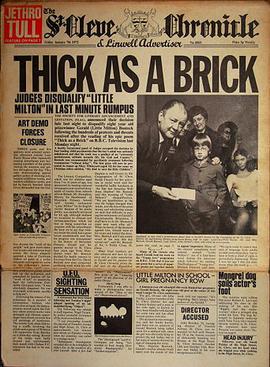
Thick as a Brick is the fifth studio album by the British rock band Jethro Tull, released on 3 March 1972. The album contains one continuous piece of music, split over two sides of an LP record, and is intended as a parody of the concept album genre. The original packaging, designed as a 12-page newspaper, claims the album to be a musical adaptation of an epic poem by fictional eight-year-old genius Gerald Bostock, though the lyrics were actually written by the band's frontman, Ian Anderson.

Aqualung is the fourth studio album by the British rock band Jethro Tull, released on 19 March 1971, by Chrysalis Records. It is widely regarded as a concept album featuring a central theme of "the distinction between religion and God", though the band have said there was no intention to make a concept album, and that only a few songs have a unifying theme. Aqualung's success signalled a turning point in the career of the band, which went on to become a major radio and touring act.

A Passion Play is the sixth studio album by British progressive rock band Jethro Tull, released in July 1973 in both the UK and US. Following in the same style as the band's previous album Thick as a Brick (1972), A Passion Play is a concept album comprising individual songs arranged into a single continuous piece of music. The album's concept follows the spiritual journey of a recently deceased man in the afterlife, exploring themes of morality, religion and good and evil. The album's accompanying tour was considered the high water mark of Jethro Tull's elaborate stage productions, involving a full performance of the album accompanied by physical props, sketches and projected video.

Ian Scott Anderson is a British musician best known for his work as the singer, flautist, acoustic guitarist, primary songwriter, and sole continuous member of the rock band Jethro Tull. He is a multi-instrumentalist who also plays harmonica, keyboards, bass guitar, bouzouki, balalaika, saxophone and a variety of whistles. His solo work began with Walk into Light in 1983; since then he has released another five albums, including the sequel to the 1972 Jethro Tull album Thick as a Brick, titled TaaB 2: Whatever Happened to Gerald Bostock? (2012).

Stand Up is the second studio album by British rock band Jethro Tull, released in 1969. It was the first Jethro Tull album to feature guitarist Martin Barre, who would go on to become the band's longtime guitarist until its initial dissolution in 2012. Before recording sessions for the album began, the band's original guitarist Mick Abrahams departed the band as a result of musical differences with frontman and primary songwriter Ian Anderson; Abrahams wanted to stay with the blues rock sound of their 1968 debut, This Was, while Anderson wished to add other musical influences such as folk rock.

Minstrel in the Gallery is the eighth studio album by British rock band Jethro Tull, released in September 1975. The album sees the band going in a different direction from their previous work War Child (1974), returning to a blend of electric and acoustic songs, in a manner closer to their early 1970s albums such as Benefit (1970), Aqualung (1971) and Thick as a Brick (1972). Making use of a newly constructed mobile recording studio commissioned and constructed specifically for the band, the album was the first Jethro Tull album to be recorded outside of the UK, being recorded in tax exile in Monte Carlo, Monaco.

War Child is the seventh studio album by Jethro Tull, released in October 1974. It was released almost a year and a half after the release of A Passion Play. The turmoil over criticism of the previous album surrounded the production of War Child, which obliged the band to do press conferences and explain their plans for the future.

John Evan is a British musician and composer. He is best known as the keyboardist for Jethro Tull from April 1970 to June 1980.

Crest of a Knave is the sixteenth studio album by British rock band Jethro Tull, released in 1987. The album was recorded after a three-year hiatus caused by a throat infection of vocalist Ian Anderson, resulting in his changed singing style. Following the unsuccessful electronic rock album Under Wraps, Crest of a Knave had the band returning to a more hard rock sound. The album was their most successful since the 1970s and the band enjoyed a resurgence on radio broadcasts, appearances in MTV specials and the airing of music videos. It was also a critical success, winning the 1989 Grammy Award for Best Hard Rock/Metal Performance Vocal or Instrumental in what was widely viewed as an upset over the favorite, Metallica's ...And Justice for All. The album was supported by "The Not Quite the World, More the Here and There Tour".
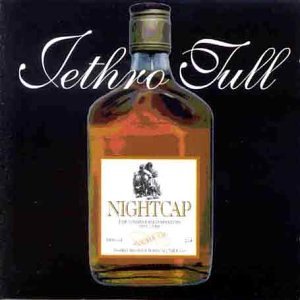
Nightcap: The Unreleased Masters 1973–1991 (1993) is a double compilation album by Jethro Tull released on 22 November 1993. It contains much of the band's previously unreleased material.
"Aqualung" is a song by the British progressive rock band Jethro Tull, and the title track from their Aqualung (1971) album. The song was written by the band's frontman, Ian Anderson, and his then-wife Jennie Franks.

Ian Anderson Plays the Orchestral Jethro Tull is a live album and DVD by Jethro Tull frontman Ian Anderson, featuring the Neue Philharmonie Frankfurt, conducted by John O'Hara. The DVD was recorded at the Rosengarten in Mannheim on 8 December 2004.
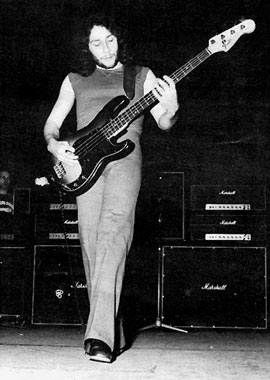
John Glascock was a British musician. He was the bassist and occasional lead vocalist of the rock band Carmen from 1972 to 1975; and the bass guitarist for progressive rock band Jethro Tull from 1976 until his death in 1979. Glascock died at the age of 28 as a result of a congenital heart valve defect, which was worsened by an infection caused by an abscessed tooth.
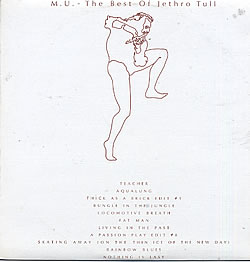
M.U. – The Best of Jethro Tull, released in 1976, is the first proper greatest hits album by Jethro Tull. It spans the years 1969 to 1975. The earlier Living in the Past (1972) compilation mainly dealt with non-album material, but this album only features one previously unreleased song, "Rainbow Blues".
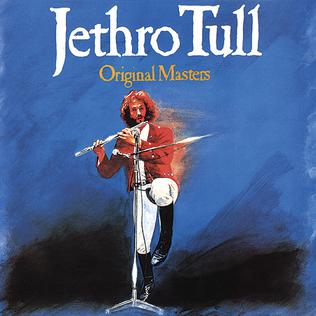
Original Masters is a greatest hits album by Jethro Tull released under Chrysalis Records in 1985. It was the band's third such effort, the first two being M.U. - The Best of Jethro Tull and Repeat - The Best of Jethro Tull - Vol II. Although the compilation was released in 1985, it does not include material released after 1977.

The Essential (2003) is a greatest hits album by Jethro Tull, digitally remastered. The songs included and their order are the same as Tull's first greatest hits album, M.U. – The Best of Jethro Tull. It is not to be confused with the similarly named Jethro Tull compilation "Essential", released in 2011.

"Bungle in the Jungle" is a song by British progressive rock band Jethro Tull. It was released on their album War Child in 1974.

"Too Old to Rock 'n' Roll: Too Young to Die" is a song by British progressive rock band Jethro Tull. Written by frontman Ian Anderson, it was released on their 1976 album of the same name. Written about an aging biker, the song title was inspired by a flight Anderson had taken in the United States.

"Teacher" is a song by the British rock band Jethro Tull, first released as the B-side to the January 1970 single "The Witch's Promise", on the Chrysalis label. Written by the band's frontman Ian Anderson, the song is a comment on the corruption of self-styled gurus who used their followers for their own gain.



















